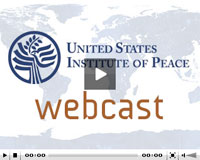Negotiating Peace and Confronting Corruption
Peace agreements are not just about achieving an end to violence-they can also establish significant frameworks for regulating future practice. In this context, one important goal is to address likely drivers of conflict. High on the list of conflict drivers are dishonesty and abuses of power by those who are holding or seeking positions of authority, phenomena that can persist and even become more prevalent following a transition.
Webcast: This event will be webcast live beginning at 2:00pm on December 13, 2011 at www.usip.org/webcast/confronting-corruption. Join the conversation on Twitter with #USIP.
Webcast: This event will be webcast live beginning at 2:00pm on December 13, 2011 at www.usip.org/webcast/confronting-corruption. Join the conversation on Twitter with #USIP.
 Peace agreements are not just about achieving an end to violence-they can also establish significant frameworks for regulating future practice. In this context, one important goal is to address likely drivers of conflict. High on the list of conflict drivers are dishonesty and abuses of power by those who are holding or seeking positions of authority, phenomena that can persist and even become more prevalent following a transition.
Peace agreements are not just about achieving an end to violence-they can also establish significant frameworks for regulating future practice. In this context, one important goal is to address likely drivers of conflict. High on the list of conflict drivers are dishonesty and abuses of power by those who are holding or seeking positions of authority, phenomena that can persist and even become more prevalent following a transition.
The U.S. Institute of Peace is pleased to host an in-depth discussion centered on Bertram I. Spector's latest book, "Negotiating Peace and Confronting Corruption." He argues that the peace negotiation table is the best place to lay the groundwork for good governance. The volume offers lessons for analysts  and practitioners on how to structure bargaining and outcomes that provide post-conflict societies with a new beginning conducive to sustainable peace and long-lasting political, economic and social
and practitioners on how to structure bargaining and outcomes that provide post-conflict societies with a new beginning conducive to sustainable peace and long-lasting political, economic and social
development
Speakers:
-
Bertram I. Spector, AuthorPresident, Center for Negotiation Analysis, and Director of Anticorruption Practice, Management Systems International
-
Graham Teskey, PanelistSenior Adviser and Head of the Governance and Anti-Corruption Secretariat, Public Sector Governance Unit, the World Bank
-
Robert M. Perito, PanelistDirector, Security Sector Governance Center, U.S. Institute of Peace
-
Alix Julia Boucher, PanelistResearch Fellow, Center for Complex Operations, National Defense University
-
Raymond Gilpin, ModeratorDirector, Center for Sustainable Economies, U.S. Institute of Peace
-
Steve Riskin, Introductory RemarksSenior Program Officer, Grant Program, U.S. Institute of Peace
Related Academy Courses
- Governance and Democratic Practices in War to Peace Transitions
- Negotiations from Checkpoints to High Politics
- Mediating Violent Conflict



